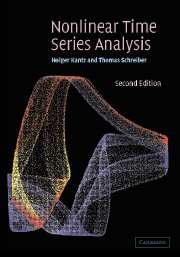Book contents
- Frontmatter
- Contents
- Preface to the first edition
- Preface to the second edition
- Acknowledgements
- I Basic topics
- II Advanced topics
- 9 Advanced embedding methods
- 10 Chaotic data and noise
- 11 More about invariant quantities
- 12 Modelling and forecasting
- 13 Non-stationary signals
- 14 Coupling and synchronisation of nonlinear systems
- 15 Chaos control
- A Using the TISEAN programs
- B Description of the experimental data sets
- References
- Index
11 - More about invariant quantities
Published online by Cambridge University Press: 06 July 2010
- Frontmatter
- Contents
- Preface to the first edition
- Preface to the second edition
- Acknowledgements
- I Basic topics
- II Advanced topics
- 9 Advanced embedding methods
- 10 Chaotic data and noise
- 11 More about invariant quantities
- 12 Modelling and forecasting
- 13 Non-stationary signals
- 14 Coupling and synchronisation of nonlinear systems
- 15 Chaos control
- A Using the TISEAN programs
- B Description of the experimental data sets
- References
- Index
Summary
In the first part of this book we introduced two important concepts to characterise deterministic chaos: the maximal Lyapunov exponent and the correlation dimension. We stressed that one of the main reasons for their relevance is the invariance under smooth transformations of the state space. Irrespective of the details of the measurement process and of the reconstruction of the state space, they will always assume the same values. Of course, this is strictly true only for ideal, noise-free and infinitely long time series, but a good algorithm applied to an approximately noise-free and sufficiently long data set should yield results which are robust against small changes in the parameters of the algorithm.
The maximal Lyapunov exponent and the correlation dimension are only two members of a large family of invariants, singled out mainly because they are the two quantities which can best be computed from experimental data. In this chapter we want to introduce a more complete set of invariants which characterises the stability of trajectories and the geometrical and information theoretical properties of the invariant measure on an attractor. These are the spectrum of Lyapunov exponents and the generalised dimensions and entropies. These quantities possess interesting interrelations, the Kaplan–Yorke formula and Pesin's identity. Since these relations provide cross-checks of the numerical estimates, they are of considerable importance for a consistent time series analysis in terms of nonlinear statistics.
- Type
- Chapter
- Information
- Nonlinear Time Series Analysis , pp. 197 - 233Publisher: Cambridge University PressPrint publication year: 2003



